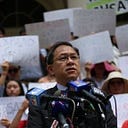What is the Asian American Perspective on Homelessness, Mental Illness and Substance Abuse in New York City?
New York City is home to the largest population of Asian Americans in the country yet their opinions have not been heard against the backdrop of mentally ill and substance addicted homelessness.
The Lucerne Hotel on the Upper Westside has spawned a contentious battle between White progressives allied with Black and Hispanic homeless advocates opposing White Black and Hispanic residents who object to the collateral effects of housing homeless addicted substance users and mentally ill men in residential communities. Yet to chime in is the Asian American community even as the battle expands to Lower Manhattan and the districts of Council Member Margaret Chin and Assembly member Yuh-line Niou, 2 of 4 Chinese American elected officials in New York. The city wants to move the residents of the Lucerne to their districts but not into a Chinese neighborhood. Ironically, Chin and Niou who identify themselves as progressive champions supported district residents at a community board meeting who did not want the men to move into the Radisson hotel, even though it is a much better facility for the men. They criticized the overnight decision by the city to move homeless men in, while their counterparts in the Upper Westside, Council Member Helen Rosenthal and Assembly Member Linda Rosenthal, also pronounced progressives, welcomed the men in their district and opposed residents who wanted them to be moved to better facilities. Though the residents and politicians disagree, one thing is certain, the homeless men are suffering. It does not appear that any of the homeless men are Asian. In fact substance abuse and severe mental illness is much lower among Asian Americans.
According to the US Department of Health and Human Services the percent of Asian Americans with serious psychological distress 18 years and over is 1.2 % compared to 3.4 % for Whites, 3.2 % for Blacks and 3.7 % for Hispanics. The 2018 National Survey on Drug Use and Health conducted by the Substance Abuse and Mental Health Services Administration found that 1.6% of Asian Americans have an illicit drug use disorder which is half the rate of the total population and illicit drug use in general by Asian Americans is 27% compared with 54% for Whites, 46 % for Blacks and 38% for Hispanics. It might be easy to say that Asian Americans are disconnected to homelessness that is brought on by drug addiction and serious mental illness because it does not affect their community, however Asians especially Chinese have a terrible history with drug addiction and may view treatment of mental illness in a different way.
In the 1600s opium abuse and addiction ravaged China as Turkish, Arab and western countries, notably Great Britain, Portugal and the United States paid for Chinese tea, silk and porcelain with addictive opium rather than silver or gold. The addiction devastated the country destroying the lives and families of Chinese both rich and poor for over 300 years through the 1950s with addiction spreading to Chinese in America. Perhaps because of the historic ravage and injustice or perhaps because drug abuse is punished so harshly now in Asian countries, Chinese and Asians shunned the use of addictive drugs in the United States. So it seems plausible that traditionally raised Asians and Asian immigrants pity addicted substance users and would advocate for the rehabilitation of victims so they can escape the detrimental physical and social effects of illicit drug use.
It follows that Asian Americans would feel the same for people who have serious mental disorders. Since illnesses such as schizophrenia and bi-polar disorders are relatively low in their community they view others with those conditions as something that should be corrected for the mercy of the victim. This can be substantiated by the relatively high number of Asian Americans who pursue a career in healthcare. Though Asian Americans are about 6% of the US population 17% of doctors are Asian American according to the Association of American Medical Colleges. It seems Asian Americans believe there is an importance in curing ailments rather than accommodating them.
This would put them at odds with elected officials like Chin, Niou, and both Helen and Linda Rosenthal who are objecting to moving the care needy men of the Lucerne to the Radisson which has better facilities for them. It would also put them at odds with the nationwide state policy of de-institutionalizing seriously mentally ill patients. Though we should never return to the wards depicted in One Flew Over the Cuckoo’s Nest, relying on non-profit community service organizations has left out many needy people precisely like those who were housed in the Lucerne.
Margaret Chin and Helen Rosenthal are term limited out of their council seats next year. Sara Lind running for Rosenthal’s seat led the campaign to keep the men in the Lucerne rather than moving them to better facilities. Candidates in Chin’s district have yet to chime in. Let’s hope they prioritize the homeless victims rather than their campaign agendas.
In the end curing mentally ill and substance abusers in appropriate locations and facilities should be the priority that would afford these people to be welcome in any community.
